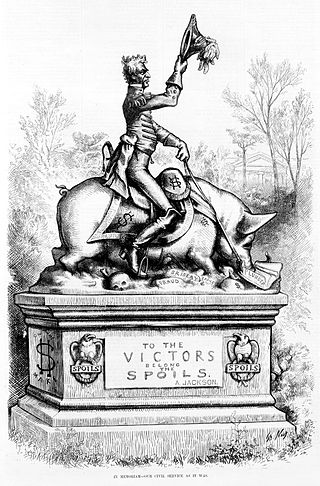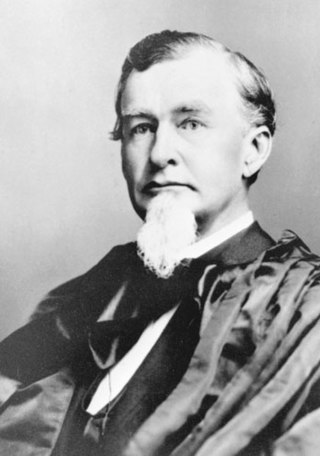
Andrew Jackson was an American politician and lawyer who served as the seventh president of the United States from 1829 to 1837. Before his presidency, he rose to fame as a general in the U.S. Army and served in both houses of the U.S. Congress. Jackson's legacy is controversial. He has been praised as an advocate for working Americans and preserving the union of states, and criticized for his racist policies, particularly towards Native Americans. His political philosophy became the basis for the Democratic Party.
A misdemeanor is any "lesser" criminal act in some common law legal systems. Misdemeanors are generally punished less severely than more serious felonies, but theoretically more so than administrative infractions and regulatory offences. Typically, misdemeanors are punished with prison time of no longer than one year, monetary fines, or community service.

Presidential elections were held in the United States from October 26 to December 2, 1824. Andrew Jackson, John Quincy Adams, Henry Clay and William Crawford were the primary contenders for the presidency. The result of the election was inconclusive, as no candidate won a majority of the electoral vote. In the election for vice president, John C. Calhoun was elected with a comfortable majority of the vote. Because none of the candidates for president garnered an electoral vote majority, the U.S. House of Representatives, under the provisions of the Twelfth Amendment, held a contingent election. On February 9, 1825, the House voted to elect John Quincy Adams as president, ultimately giving the election to him.

In politics and government, a spoils system is a practice in which a political party, after winning an election, gives government jobs to its supporters, friends (cronyism), and relatives (nepotism) as a reward for working toward victory, and as an incentive to keep working for the party. It contrasts with a merit system, where offices are awarded or promoted on the basis of some measure of merit, independent of political activity.

The Battle of New Orleans was fought on January 8, 1815, between the British Army under Major General Sir Edward Pakenham and the United States Army under Brevet Major General Andrew Jackson, roughly 5 miles (8 km) southeast of the French Quarter of New Orleans, in the current suburb of Chalmette, Louisiana.

Jacksonian democracy was a 19th-century political philosophy in the United States that restructured a number of federal institutions. Originating with the seventh U.S. president, Andrew Jackson and his supporters, it became the nation's dominant political worldview for a generation. The term itself was in active use by the 1830s.

Howell Edmunds Jackson was an American attorney, politician, and jurist who served as an Associate Justice of the Supreme Court of the United States from 1893 until his death in 1895. His brief tenure on the Supreme Court is most remembered for his opinion in Pollock v. Farmers' Loan & Trust Co., in which Jackson argued in dissent that a federal income tax was constitutional. Republican President Benjamin Harrison appointed Jackson, a Democrat, to the Court. His rulings demonstrated support for broad federal power, a skepticism of states' rights and an inclination toward judicial restraint. Jackson's unexpected death after only two years of service prevented him from having a substantial impact on American history.
Red Sticks —the name deriving from the red-painted war clubs of some Native American Creek—refers to an early 19th century traditionalist faction of Muscogee Creek people in the Southeastern United States. Made up mostly of Creek of the Upper Towns that supported traditional leadership and culture, as well as the preservation of communal land for cultivation and hunting, the Red Sticks arose at a time of increasing pressure on Creek territory by European American settlers. Creek of the Lower Towns were closer to the settlers, had more mixed-race families, and had already been forced to make land cessions to the Americans. In this context, the Red Sticks led a resistance movement against European American encroachment and assimilation, tensions that culminated in the outbreak of the Creek War in 1813. Initially a civil war among the Creek, the conflict drew in United States state forces while the nation was already engaged in the War of 1812 against the British.

Dominic Augustin Hall was chief justice of the Louisiana Supreme Court, chief judge for the United States Circuit Court for the Fifth Circuit, and a judge for the United States District Court for the District of Louisiana and the District of Orleans.

John Catron was an American jurist who served as an associate justice of the Supreme Court of the United States from 1837 to 1865, during the Taney Court.

Andrew Jackson is a bronze equestrian statue by Clark Mills mounted on a white marble base in the center of Lafayette Square within President's Park in Washington, D.C., just to the north of the White House. Jackson is depicted dressed in military uniform, raising his hat with his right hand, while controlling the reins with his left hand as his horse rises on its rear legs.

Lyncoya Jackson, also known as Lincoyer or Lincoya, was an Indigenous American from a family that was a part of the Upper Creek tribal-geographical grouping and more than likely affiliated with Red Stick political party. The family lived in the Muscogee tribal town at Tallasseehatchee Creek in present-day eastern Alabama. Lyncoya's parents were killed on November 3, 1813, by troops led by John Coffee at the Battle of Tallusahatchee, an engagement of the Creek War and the larger War of 1812. Lyncoya survived the massacre and the burning of the settlement and was found lying on the ground next to the body of his dead mother. He was one of two Creek children from the village who were taken in by militiamen from Nashville, Tennessee. Lyncoya was the third of three Native American war orphans who were transported to Andrew Jackson's Hermitage in 1813–14. The other two, Theodore and Charley, died or disappeared shortly after their arrivals in Tennessee, but Lyncoya survived and was raised in the household of former slave trader and ex-U.S. Senator Andrew Jackson.
Martial law in the United States refers to times in United States history in which in a region, state, city, or the whole United States was placed under the control of a military body. On a national level, both the US President and the US Congress have the power, within certain constraints, to impose martial law since both can be in charge of the militia. In nearly every state, the governor has the power to impose martial law within the borders of the state. In the United States, martial law has been used in a limited number of circumstances, such as New Orleans during the Battle of New Orleans; after major disasters, such as the Great Chicago Fire of 1871, the 1906 San Francisco earthquake, or during riots, such as the Omaha race riot of 1919 or the 1920 Lexington riots; local leaders declared martial law to protect themselves from mob violence, such as Nauvoo, Illinois, during the Illinois Mormon War, or Utah during the Utah War; or in response to chaos associated with protests and rioting, such as the 1934 West Coast waterfront strike, in Hawaii after the Japanese attack on Pearl Harbor, and during the Civil Rights Movement in response to the Cambridge riot of 1963.
Austin Woolfolk was an American slave trader and plantation owner. Among the busiest slave traders in Maryland, he trafficked more than 2,000 enslaved people through the Port of Baltimore to the Port of New Orleans, and became notorious in time for selling Frederick Douglass's aunt, and for assaulting Benjamin Lundy after the latter had criticized him.

Dominic A. Hall and Louis Louaillier were American political figures who were ordered detained during the War of 1812 under the order of Major General Andrew Jackson in 1815. Hall later put Jackson under investigation and oversaw the trial that led to Jackson being fined.

The following is a list of important scholarly resources related to Andrew Jackson.
Andrew Jackson, I am given to understand, was a patriot and a traitor. He was one of the greatest of generals, and wholly ignorant of the art of war. A writer brilliant, elegant, eloquent, without being able to compose a correct sentence, or spell words of four syllables. The first of statesmen, he never devised, he never framed a measure. He was the most candid of men, and was capable of the profoundest dissimulation. A most law-defying, law-obeying citizen. A stickler for discipline, he never hesitated to disobey a superior. A democratic autocrat. An urbane savage. An atrocious saint.
Abortion in Louisiana is illegal as of August 1, 2022.
This is a list of portraits of Andrew Jackson, who was the seventh president of the United States.

Peter Le Barbier Duplessis, was the first United States Marshal of the State of Louisiana, and “played an important role in the defense and development of a still young United States …helping General Andrew Jackson not only save the city [of New Orleans] but also save his [Jackson’s] reputation many years later.”













